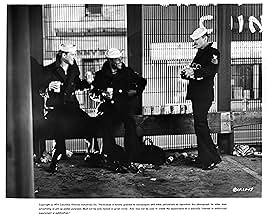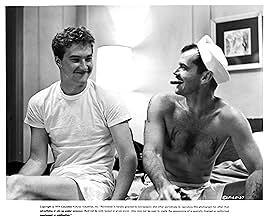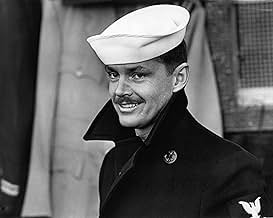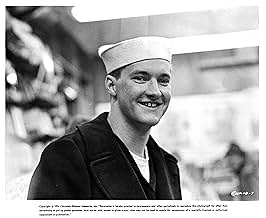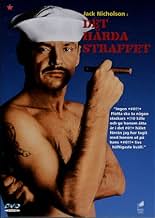IMDb RATING
7.5/10
30K
YOUR RATING
Two Navy men are ordered to bring a young offender to prison, but decide to show him one last good time along the way.Two Navy men are ordered to bring a young offender to prison, but decide to show him one last good time along the way.Two Navy men are ordered to bring a young offender to prison, but decide to show him one last good time along the way.
- Nominated for 3 Oscars
- 6 wins & 9 nominations total
Patricia Hamilton
- Madame
- (as Pat Hamilton)
- Director
- Writers
- All cast & crew
- Production, box office & more at IMDbPro
Featured reviews
Don't let the fact that the DVD cover makes this movie look like gay porn keep you from seeing it.
Director Hal Ashby made a string of unfussy but very, very good films throughout the 1970s, and "The Last Detail" is one them. The story doesn't sound like much: two Navy officers are assigned to escort a third to the prison where he will be serving time. Along the way, the requisite male bonding ensues, and the older, jaded officer (Jack Nicholson) has a chance to reflect upon his own fortune and misfortune and be a sort of father figure, for better or worse, to his young and troubled charge (played extremely well by Randy Quaid).
Like all of Ashby's films, "The Last Detail" challenges things like duty and institutional authority, which made Ashby one of the most vocal of the anti-establishment directors from a volatile period of American history. But also like all of his films, it poses challenges in a low-key, non-confrontational way, without sacrificing its bite.
Well done.
Grade: A
Director Hal Ashby made a string of unfussy but very, very good films throughout the 1970s, and "The Last Detail" is one them. The story doesn't sound like much: two Navy officers are assigned to escort a third to the prison where he will be serving time. Along the way, the requisite male bonding ensues, and the older, jaded officer (Jack Nicholson) has a chance to reflect upon his own fortune and misfortune and be a sort of father figure, for better or worse, to his young and troubled charge (played extremely well by Randy Quaid).
Like all of Ashby's films, "The Last Detail" challenges things like duty and institutional authority, which made Ashby one of the most vocal of the anti-establishment directors from a volatile period of American history. But also like all of his films, it poses challenges in a low-key, non-confrontational way, without sacrificing its bite.
Well done.
Grade: A
I read somebody's comment that this film isn't "deep." I think that viewer missed a whole layer of the story. you have to keep in mind that this was written and produced during the vietnam war and released during the early months of Watergate.
The story is about these two working class sailors, who are completely disenfranchised, just "doing their job." They're good guys but in the end, don't lift a finger to stop a massive injustice. They don't even take the time to think about it, because they feel there's nothing they can do about it. They pay lip services to how wrong things are about the situation, but in the end they do what "the man" says and they're just as much to blame for the problem as the commanding officers above them.
Through the course of the film, the sailors meet a lot of "chatting class" folks who are mad at Nixon and discussing politics, and they meet Hari Krishnas who are chanting to change things, but nobody is really taking any ACTION. Everyone is pissed off at the injustice of the world but nobody does anything about it. It's about inaction. And that inaction slowly boils up in the main characters and turns into anger that brings the film to a sad end. (It's one of those great stories that gets you pissed off at the injustice in the world...)
Having said all that, on a more tangible level, the performances and scripting are full of emotion and Nicholson's and Quaid's performance are amazing and hilarious to watch. But this isn't really a comedy in the end...more tragic really (with some good laughs along the way).
Check it out!
The story is about these two working class sailors, who are completely disenfranchised, just "doing their job." They're good guys but in the end, don't lift a finger to stop a massive injustice. They don't even take the time to think about it, because they feel there's nothing they can do about it. They pay lip services to how wrong things are about the situation, but in the end they do what "the man" says and they're just as much to blame for the problem as the commanding officers above them.
Through the course of the film, the sailors meet a lot of "chatting class" folks who are mad at Nixon and discussing politics, and they meet Hari Krishnas who are chanting to change things, but nobody is really taking any ACTION. Everyone is pissed off at the injustice of the world but nobody does anything about it. It's about inaction. And that inaction slowly boils up in the main characters and turns into anger that brings the film to a sad end. (It's one of those great stories that gets you pissed off at the injustice in the world...)
Having said all that, on a more tangible level, the performances and scripting are full of emotion and Nicholson's and Quaid's performance are amazing and hilarious to watch. But this isn't really a comedy in the end...more tragic really (with some good laughs along the way).
Check it out!
If you respond to this film, you will probably go all the way and love it as much as I do. It is probably the high point of the drama of social realism started back by the like of "Marty."
It is Nicholson's film, yet Quaid and Otis Young(in his only good movie) really shine as well. It is the most heartbreaking of material played without sap or sentiment. Obscenity like this was still pretty new to movies back in 73, be sure to avoid edited T.V. versions. Reading the comments, it is sad that todays movie fans, spoonfed sledgehammer crappola, really can't respond to a drama played with the kind of subtle grace of "The Last Detail." Give it a shot. Ten out of ten.
It is Nicholson's film, yet Quaid and Otis Young(in his only good movie) really shine as well. It is the most heartbreaking of material played without sap or sentiment. Obscenity like this was still pretty new to movies back in 73, be sure to avoid edited T.V. versions. Reading the comments, it is sad that todays movie fans, spoonfed sledgehammer crappola, really can't respond to a drama played with the kind of subtle grace of "The Last Detail." Give it a shot. Ten out of ten.
Nicholson's "Bad Ass" is a beautifully crafted piece of character. He cusses. He fights. He drinks. He's loud. No one else speaks Robert Towne's words better than Nicholson. In this film he overwhelms at every turn. In the bar scene, he shows brute anger and a desire for dominance. The scenes with a young Nancy Allen are delightfully witty because of Nicholson's schoolboy antics of getting a woman into bed.
It is the scenes with Randy Quaid (also wonderful) where Nicholson shines brightest. "Bad Ass" represents a paternal figure lacking in Meadows' life. He makes him a man by demanding he send back a hamburger if it's not cooked the way he likes it. He demands Meadows to stop crying and be a man. He demands Meadows to stand up for himself and fight when someone pushes his buttons. He demands Meadows to want to have sex, like other men his age. Nicholson's father figure image here is played off perfectly as Meadows sort of imitates things "Bad Ass" does. If Bad Ass has a beer, Meadows has a beer. If Bad Ass wants a woman, Meadows wants a woman. There's a secret trust between the two. It's unspoken, but it's there. That trust is broken in the end when Meadows tries to escape. It wasn't all a lie, Meadows just felt that it was time to stop learning and start moving.
It is the scenes with Randy Quaid (also wonderful) where Nicholson shines brightest. "Bad Ass" represents a paternal figure lacking in Meadows' life. He makes him a man by demanding he send back a hamburger if it's not cooked the way he likes it. He demands Meadows to stop crying and be a man. He demands Meadows to stand up for himself and fight when someone pushes his buttons. He demands Meadows to want to have sex, like other men his age. Nicholson's father figure image here is played off perfectly as Meadows sort of imitates things "Bad Ass" does. If Bad Ass has a beer, Meadows has a beer. If Bad Ass wants a woman, Meadows wants a woman. There's a secret trust between the two. It's unspoken, but it's there. That trust is broken in the end when Meadows tries to escape. It wasn't all a lie, Meadows just felt that it was time to stop learning and start moving.
Though the film's storyline diverges from the more existential theme of the Darryl Ponicsan novel from which it was adapted, 'The Last Detail' was, is, and remains the only real deal film about navy enlisted men. Hollywood never did sailors so well as it does them here.
If you don't care for testosterone-impelled behavior, parochial esprit de corps, scatology, and profanity - well, never mind: the dialogue here is true-to-life sailorese, and the hi- and low-jinks antics are too. If you can't take the heat, get the hell out of the galley.
Gritty cinematography of the earthy, low-rent world of enlisted sailors (for example, watching the "decent peoples' world" pass by the filth-streaked windows of a worn, smelly railway car) communicates much of the characters' experience of life in the margins and their ethos and how they came by them. The Johnny Mandel score is often oddly, and too-cheerfully irrelevant, though one suspects its breezy take on nautical marches and ditties was meant to be satirical; but it's often discordant with the serious themes - 'the individual versus society', existential choice and haplessness - of 'The Last Detail'.
In a role that could have been tailor-made for him Jack Nicholson's acting is perhaps the best of his career - a superior foreshadowing of his later turn in 'One Flew Over the Cuckoo's Nest'. But without Otis Young as his fellow seasoned petty officer and Randy Quaid as the naive young, brig-bound seaman, Nicholson's tour de force would have fallen as flat as a flathat (for all you landlubbers: the navy blue "Donald Duck" US NAVY-ribbon bound winter sailors' hats, which sailors hated intensely, that were abolished in the early 60's).
Politically correct left-leaning folks should discover in Gunners Mate 1st Class "Mule" Mulhall a perfect example of an African American professional sailor: serious yet fun-loving; jocular but no-nonsense; competent and quietly self-assured: in short, a sailor among sailors, a man among men. I know because I served, and when the chips were up or down no sailor cared about color, and each of us cared only that he or she could rely, or not, on our shipmates. Though it has its arcane rules, written and unwritten, the naval service is remarkably egalitarian in opportunity - and it is so without all the hue and cry of civilian "social consciousness".
Though it's a marvel of a film, 'The Last Detail' could not cram into its running time all the humor and pathos of the eponymous, tough-tender Ponicsan novel (in which petty officer Mulhall's character looms quite a bit larger than he does in the movie, and Billy Buddusky's reflexive resorting to signalling with his Signalman's semaphoring hands spells out apt clues to his worldview); and the novel (which, incidentally, I read while on active duty, before the film had been made) turns out with a dramatically different ending - with a true denouement absent from the screenplay's conclusion that left me wanting, and which is the film's only grave, if quibbling, flaw. But the screenplay incorporates characters, scenes (Carol Kane as the careworn young whore providing Quaid's Seaman Meadows his first experience of coupling), and dialogue that might also have helped the novel to better flesh out and plumb the characters and their experience. Small matter, really: the book and the film contrast and complement each other perfectly.
Anyone considering enlistment should see 'The Last Detail' because it tells enlisted sailors' life like it is. If you can take life like it is, with or without the occasional fix ('An Officer and a Gentleman' anyone?) of kitschy, unrealizable romantic fantasy, then 'The Last Detail' is your meat.
The Real Deal. Chow Call, Chow Call - All hands lay to the messdeck! Take all you want - Eat all you take. Down to 'The Last Detail'.
If you don't care for testosterone-impelled behavior, parochial esprit de corps, scatology, and profanity - well, never mind: the dialogue here is true-to-life sailorese, and the hi- and low-jinks antics are too. If you can't take the heat, get the hell out of the galley.
Gritty cinematography of the earthy, low-rent world of enlisted sailors (for example, watching the "decent peoples' world" pass by the filth-streaked windows of a worn, smelly railway car) communicates much of the characters' experience of life in the margins and their ethos and how they came by them. The Johnny Mandel score is often oddly, and too-cheerfully irrelevant, though one suspects its breezy take on nautical marches and ditties was meant to be satirical; but it's often discordant with the serious themes - 'the individual versus society', existential choice and haplessness - of 'The Last Detail'.
In a role that could have been tailor-made for him Jack Nicholson's acting is perhaps the best of his career - a superior foreshadowing of his later turn in 'One Flew Over the Cuckoo's Nest'. But without Otis Young as his fellow seasoned petty officer and Randy Quaid as the naive young, brig-bound seaman, Nicholson's tour de force would have fallen as flat as a flathat (for all you landlubbers: the navy blue "Donald Duck" US NAVY-ribbon bound winter sailors' hats, which sailors hated intensely, that were abolished in the early 60's).
Politically correct left-leaning folks should discover in Gunners Mate 1st Class "Mule" Mulhall a perfect example of an African American professional sailor: serious yet fun-loving; jocular but no-nonsense; competent and quietly self-assured: in short, a sailor among sailors, a man among men. I know because I served, and when the chips were up or down no sailor cared about color, and each of us cared only that he or she could rely, or not, on our shipmates. Though it has its arcane rules, written and unwritten, the naval service is remarkably egalitarian in opportunity - and it is so without all the hue and cry of civilian "social consciousness".
Though it's a marvel of a film, 'The Last Detail' could not cram into its running time all the humor and pathos of the eponymous, tough-tender Ponicsan novel (in which petty officer Mulhall's character looms quite a bit larger than he does in the movie, and Billy Buddusky's reflexive resorting to signalling with his Signalman's semaphoring hands spells out apt clues to his worldview); and the novel (which, incidentally, I read while on active duty, before the film had been made) turns out with a dramatically different ending - with a true denouement absent from the screenplay's conclusion that left me wanting, and which is the film's only grave, if quibbling, flaw. But the screenplay incorporates characters, scenes (Carol Kane as the careworn young whore providing Quaid's Seaman Meadows his first experience of coupling), and dialogue that might also have helped the novel to better flesh out and plumb the characters and their experience. Small matter, really: the book and the film contrast and complement each other perfectly.
Anyone considering enlistment should see 'The Last Detail' because it tells enlisted sailors' life like it is. If you can take life like it is, with or without the occasional fix ('An Officer and a Gentleman' anyone?) of kitschy, unrealizable romantic fantasy, then 'The Last Detail' is your meat.
The Real Deal. Chow Call, Chow Call - All hands lay to the messdeck! Take all you want - Eat all you take. Down to 'The Last Detail'.
Did you know
- TriviaThe script was completed in 1970 but contained too much profanity to be shot as written. Columbia Pictures waited for two years trying to get writer Robert Towne to tone down the language. Instead, by 1972, the standards for foul language relaxed so much that all the profanity was left in.
- GoofsThe MAA Master Chief is not wearing a Master-at-Arms rating badge; he is wearing a Boatswain mate rating badge.
The Master At Arms rating was disestablished in 1921, but was officially re-established on 1 August 1973. Therefore, as the story takes place, a Master Chief Boatswain's Mate being assigned the collateral duty of MAA is entirely accurate.
- SoundtracksNever Let The Left Hand Know
by Jack Goga
- How long is The Last Detail?Powered by Alexa
Details
- Release date
- Country of origin
- Official sites
- Language
- Also known as
- El último deber
- Filming locations
- Production companies
- See more company credits at IMDbPro
Box office
- Budget
- $2,300,000 (estimated)
Contribute to this page
Suggest an edit or add missing content



